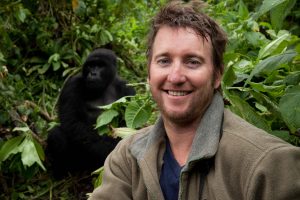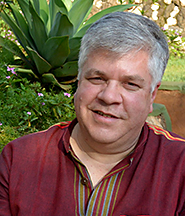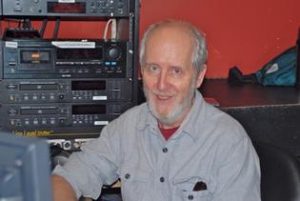Australian scientist James Watson, who is influential globally, gives us the bad news: since the 1990’s on planet Earth we just lost 10 percent of the wilderness. Then Canadian author & teacher Peter Denton takes us deep into our role as possibilities in reality, with his new book “Live Close to Home.”
I’m Alex. Let’s get going with Radio Ecoshock. You can listen right now.
Download or listen to this Radio Ecoshock show in CD Quality (56 MB) or Lo-Fi (14 MB)
LISTEN NOW
CD Quality
Lo-Fi
JAMES WATSON – DISAPPEARING WILDERNESS
“Wilderness lost: Earth’s wild lands in catastrophic decline” – that’s the headline in a September 13 article in the Christian Science Monitor (online). “Catastrophic”? I wondered. It turns out yes, since 1990, we have lost 10% of all the wilderness left in the world.

Dr. James Watson, conservation scientist
The scientist leading a new paper all about this is Dr. James Watson. He’s from the University of Queensland in Australia, and the World Conservation Society. The short bio on this WCS page the many global connections Watson has. He’s a world-known scientist.
THE NEW PAPER THAT SHOWS HOW FAST WE’VE LOST THE WILD
The new paper is titled ” “Catastrophic Declines in Wilderness Areas Undermine Global Environment Targets” about to be published in the journal “Current Biology”. This is exciting science with dreadful news. You can download the whole paper, as a pdf, from this page.
Essentially, a team of scientists with great patience assembled and compared early satellite land maps with more recent photos from space. The evidence is plain: huge swaths of nature, untouched by humans, now have roads, mines, logging or settlements in them. As Watson tells us, soon all that will remain will be the “unwanted” places, where humans can’t find good living or an economic value. That might be the frozen lands, deserts, and mountains – all the places where biodiversity is low. The remaining spots will also be low in evolutionary terms, meaning we are killing off the well that produces new life.
It’s partly just a function of human population. We add more billions of people, and they keep appropriating wilderness. But even more it’s consumer society. We demand more, and more raw materials are needed to keep feeding the machine. Anything for a buck.
Maybe you already guessed this was happening, but now we now for sure. Plus we didn’t know how fast wilderness is disappearing until this paper.
I was surprised to learn in this interview that one of the largest intact wild places on Earth is in China: the Tibetan Plateau. At least China has claimed it, and now manages the Plateau.
WILDERNESS LOSS FUELS MORE CLIMATE CHANGE
Disappearing wilderness is also yet another positive feedback effect on the climate, Watson says. When tropical forests are cut down, and not replaced, or replaced with industrial agriculture, there are three ways more carbon reaches the atmosphere. The trees themselves are mostly carbon and they let it go. Industrial agriculture, especially plowing, releases more carbon. Plus in some places, tropical peat bogs and other super-greenhouse gas sinks become exposed. They may burn, as Indonesia did in 1997-98, making that country the world’s third largest source of greenhouse gases for those years.
Of course, it’s far more than a carbon story. The largest creatures that need a big range area, like elephants and tigers, become endangered quickly. All sorts of plants and bugs disappear forever. We may have needed something from them, like cancer drugs, but even more truely, all species on Earth have a right to be here. We are engaged in a slaughter of the other inhabitants of this planet, and that won’t end well.
Dr. Watson and I have a lively discussion about the science and the reality of disappearing wilderness. He also tells us about his “Green Fire” science group of students and PhDs that go out into the real world to apply conservation science. Both Watson and his group as busy, especially in Asia and Africa, even advising governments on how to save the last of their wild spaces.
Download or listen to this Radio Ecoshock 25 minute interview with Dr. James Watson (CD Quality).
PETER DENTON – LIVE CLOSE TO HOME
As a person who intentionally chose a walk-able village in a major food producing area, closer to my relatives – I know my listeners want a more sustainable world. This book “Live Close to Home” seems right on target.
In 2006, I recorded a speech in a church by British writer George Monbiot. George was touring for his climate book “Heat”. He said that “Love Miles” might do us in. He meant the distances covered by so many of us, especially in airplanes, simply to see family members. George suggested we return to the older practice of marrying people who live close to us. In the Middle Ages, it was quite common for most people to spend their lives within the radius their feet could carry them. Some never travelled more than 30 miles away.
But it goes much deeper than that, from food miles to product shipping. Our next guest says we all must learn four new words as the mantra for our lives: “Live Close to Home”. That’s the title of the new book by Canadian author and scholar Dr. Peter Denton.
Peter is an odd-mixture. He teaches soldiers about religion and war at the Royal Military College of Canada. Yet he’s an ordained minister of the United Church. Dr. Denton holds five degrees. He’s one of the two Regional Representatives for North American Stakeholders at the United Nations Environment Programme or (UNEP). Denton writes seamlessly on military theory like “battlespace”, about the essence and impact of technology, and the role of ethics in our survival.

Author Peter Denton
He’s written a 3 book series on sustainability – all of them recommended by Bill McKibben of 350.org, and published by Rocky Mountain Books.
His newest book is about something all of us can do, really must do, to swing away from catastrophic emissions of greenhouse gases, a grander vision of what “localization” really means.
My wife and I loved a certain river valley in British Columbia. For years, we drove there every summer to find peace in Nature. Knowing that was nuts in terms of climate damage, we moved here. It’s a village of about 600 people, surrounded by fields, right next to a major food producing area. It took us ten years to get out of the city. But all of humanity cannot leave cities, I know that. I’ve done a whole program on that: “We Can’t All Go Back to the Land“.
Even with our plan and our move, I’m still buying tools and all sorts of stuff made in China and shipped half-way round the world. Can we ever reverse globalization? Should we? Will we be forced to?
I’m surrounded by products and services from people I never see or meet. It’s almost like a ghost world. Are we already inhabiting an artificial reality?
We also talk about Denton’s earlier book “Gift Ecology“. There could be an alternative to the consumer economy there.
In “Live Close to Home” Peter examines six threads to this key pathway to sustainability. There are chapters on food, knowledge, reality, community, economy, and ecology.
I asked if “Live Close to Home” has a step-by-step map for us to take action, to live locally. Peter said (I paraphrase) that would be a waste of time, because each of us is so unique in our situation. But more than that, living close to home isn’t just about local food and local products (which are important) – but also really being in the reality around us. For example maybe we should make some real friends and neighbours, instead of depending so much on online contacts…. We also need to be able to shut down our screens and participate with whatever nature we can find.
Download or listen to this half hour interview with Peter Denton in CD Quality.
Peter tells me “Sustainability is not a scientific problem, but a social and cultural one.” So just covering science is not enough. I’ll have to keep that in mind, as Radio Ecoshock rolls on.
Find out more about Peter Denton and his work at his web site: http://peterdenton.ca/
I enjoyed watching this You tube video of Peter “Sustainability, ethics and war” – although Denton says he has better work out there. In the video, I was struck by his assessment that building toward sustainability can be undone if we can’t make enough solutions in time – and war intervenes.
MORE PETER DENTON BIO INFO FROM HIS UNIVERSITY OF MANITOBA WEB PAGE
“He is also a regular contributor to the Canadian Military Journal and to Essays in Philosophy, for which journal he edited the January 2015 issue on the philosophy of democracy and contributed an article (“The End of Democracy”).
Denton is an instructor in Technical Communications and Ethics at Red River College, and teaches ethics by distance education for the Philosophy Department at the University of Manitoba. He is also a Research Associate of the Centre for Professional and Applied Ethics. An ordained minister of the United Church of Canada, he holds five degrees, culminating in a Ph.D. in Religion and the Social Sciences (McMaster).”
In his blog, Peter writes about the dying breed of book readers. In our interview, he argues why we should go back to reading books.
AND ONE MORE FROM ALEX
At the end of the show, I play half of my own song about disappearing creatures in the wilderness. It’s called “She Did Not Say” and you can listen to or share the whole thing here on Soundcloud. There’s a Creative Commons copyright on my music, which means anyone can use it for any non-profit purpose. Please, spread it around!
I hope you support my special appeal for financial support during the next two weeks. My Radio Ecoshock account is down to a couple of hundred bucks – and the bills keep coming in. Please help keep this show going, by donating at this page.
You can choose several ways to donate. A small but much appreciated group of listeners contribute $10 a month automatically, through their bank accounts. Others make one-time donations of any amount. I’m hoping some of my previous larger donors will hear this call and step up again now, but all help is appreciated.
If you don’t want to use an online service, or don’t like Paypal, you can send a check made out to “Ecoshock”. Please don’t make it payable to “Alex Smith”. The show bank account in Vancouver is in the name “Ecoshock”.
Thanks for keeping me going in this radio campaign!
Alex
